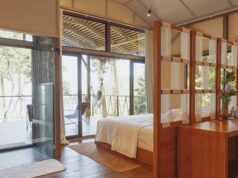BOSTON—Carbonwave, a world leader in upcycling the largest seaweed bloom on the planet into ultra-regenerative, plant-based, advanced biomaterials, announced an initial closing of its $5M Series A round led by Mirova, an affiliate of Natixis Investment Managers dedicated to sustainable investment, with additional significant participation from Viridios Capital, Popular Impact Fund, and Katapult Ocean.
This investment round brings the total funding to date to $12M and will be used to build large-scale cosmetics emulsifier production facilities in Puerto Rico to satisfy growing customer demand for biomaterials. The current Puerto Rico facility, used for R&D, has also successfully developed a leather alternative from Sargassum (the floating seaweed masses), which it will be launching soon. The company has already developed Sarga Agriscience (Sarga Ag), a line of organic agricultural inputs made from Sargassum’s liquid compounds that increase yields, allow crops to survive drought more effectively, and reduce the need for nitrogen fertilizer. Sarga Ag products are being tested for large-scale application by some of the leading corporate growers in the world. In June 2022, Carbonwave won the Carbon to Value Challenge with BASF, Seafields, and the Alfred Wegner Institute to produce PET plastics. Additionally, Carbonwave has already sold half a ton of its SeaBalance2000, the world’s first seaweed-based cosmetic emulsifier, which was named ‘Best Functional Ingredient’ at In-Cosmetics Korea in 2022.
“In three short years, we’ve become the first company to build a scalable cascading biorefinery to create a commercially sustainable operation harnessing Sargassum into high-value products,” said Geoff Chapin, co-founder, and CEO of Carbonwave. “Support from our investors and partners has allowed us to catalyze our proprietary technology and manufacturing process to turn the Caribbean’s seaweed crisis into an economic opportunity and a climate solution. We are producing viable alternatives that redirect demand from fossil fuel-based products by cost-effectively developing a wide range of regenerative, low-carbon, and plant-based alternatives that global industries are seeking to advance their sustainability and decarbonization initiatives, while contributing to the bio-circular economy.”
“Mirova, through the Sustainable Ocean Fund, is thrilled to continue its support for Carbonwave with this follow-on investment into the company,” said Simon Dent, Head of Blue Investments at Mirova. “We believe that Carbonwave’s processing of Sargassum into high-value products is an excellent example of the Blue Economy at work, whilst also providing a unique solution to help address decarbonization.”
A Threat to Tourism
Historically, Sargassum seaweed mats have been a feature of the North Atlantic Ocean. However, in the past 12 years, warming ocean temperatures and increased fertilizer and pollution runoff have triggered a separate bloom—the largest seaweed bloom on the planet—in the Caribbean. Known as the great Atlantic Sargassum belt, this yearly bloom poses a suffocating threat spanning from West Africa to the Gulf of Mexico, where it clogs bays and beaches, threatens tourism, harms the local ecology, and presents other problems. As it accumulates on beaches and in landfills, it decomposes, releasing vast amounts of methane, which increases the pace of global warming.
Traditionally, most commercial seaweed science has focused on extracting simple, raw compounds from better researched species like kelp. Carbonwave is the first company to chart a route to profitably process Sargassum and has developed a novel and proprietary method of extracting its unique biopolymers that are even more valuable than the simple compounds when extracted separately. This extraction method has made Carbonwave the first in the world to produce a wide range of Sargassum-based biomaterials that can displace fossil fuel-based products, such as emulsifiers, textiles, and plastics.
Carbonwave is uniquely suited to addressing the large-scale processing of Sargassum and its diverse product opportunities. Sargassum doubles its size every 10 to 21 days, and unlike terrestrial plants, does not require land, irrigation, or added nutrients to grow. Among seaweeds, Sargassum is one of the most promising: as a pelagic species, it does not require a particular topography or fixed infrastructure to grow at scale (unlike kelp).
Carbonwave has two operations—one in Puerto Morelos, Quintana Roo, Mexico, and the other in Carolina, Puerto Rico—and is exploring additional ventures in the Caribbean to bring about new economic opportunities centered on sustainability, climate, and positive social and economic impact.






